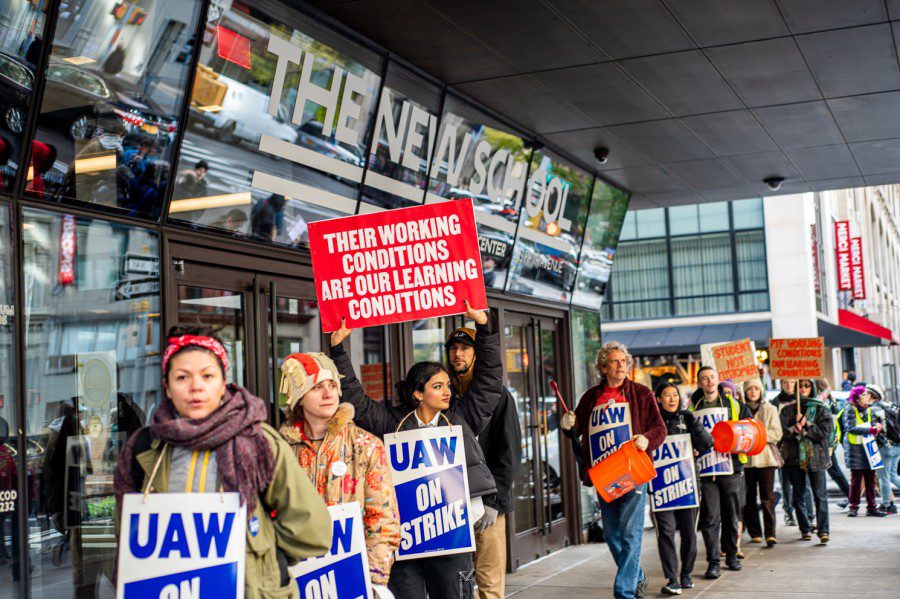Two weeks into strike, New School claims it can’t afford faculty demands
The New School has agreed to continue bargaining with the union representing its striking part-time faculty, but has said it does not have the financial resources to compromise further.
File photo: The New School adjuncts went on strike on Nov. 16, joined on the picket line by students. (Manasa Gudavalli for WSN)
December 2, 2022
On the 16th day of a strike that has halted most academic operations at The New School, an overwhelming 95% of part-time faculty voted against the university’s “final offer” for a new contract. The university agreed to return to the bargaining table after the vote, results of which were announced on Dec. 1, but claimed that its budget does not allow it to meet the striking union’s current demands.
Lily Sisson, a New School sophomore who attended the strike on Thursday, said she doesn’t believe the university’s claims about its finances, and said that she thinks the strike will continue until the union’s demands are met.
“It’s high time that they come back to the bargaining table — they never should have walked away after proposing a ridiculous contract,” Sisson said. “People here are prepared to continue protesting and striking until they get what they deserve, a fair contract.”
Part-time faculty at The New School first called a strike on Nov. 16 after they failed to reach an agreement with the university for a new contract. Despite months of negotiations and a two-week picket line outside of the school’s main building, both parties still disagree on terms regarding compensation, health care and workplace protections.
Since the strike began, most classes have been canceled, as part-time faculty comprise 87% of the university’s total teaching staff. Some full-time faculty have also canceled classes in solidarity with their colleagues.
On Nov. 20, The New School proposed a new contract to part-time faculty, which included compromises on several key demands. It referred to the offer as “final,” even though it committed to continue bargaining. But the union was not satisfied, and accused the university of abandoning the negotiation process. The university gave the union until Tuesday, Nov. 29 to respond to the offer; and on Thursday, membership struck the proposal down.
The “final offer” included a 7% increase in wages for this academic year and a 2.5% increase in subsequent years — which the union called insufficient. According to union representatives, part-time faculty at The New School have not received a raise since 2018. This means that when the new contract expires, the compensation increases will average to about 1.8% per year, according to the union — lower than increases won by other unionized New School employees, including librarians.
The university refuted information regarding its finances provided by the union, claiming that the union overcalculated administrator pay while underestimating the cost of instruction and research.
Sanjay Reddy, the chair of The New School’s economics department, conducted an in-depth analysis of the university’s finances from the last few years. He said that after comparing compensation for top administrators at The New School with other universities, he found that the university pays administrators proportionally higher salaries than other institutions with larger endowments.
Reddy’s data shows that in 2019, the university’s 1,979 part-time faculty and 427 full-time professors combined were paid a total of $120 million in salaries, wages and benefits. Non-instructional employees, including administrators, cost the school $149 million.
Reddy also found that the New School is dependent on tuition income, which corresponds with the university’s claims. In 2019, $314 million of the university’s $427 million in revenue came from student tuition and fees. Reddy said that the university is spending only a fraction of its revenue on instructional costs, adding that he thinks it has room to reduce spending in other areas of its budget.
“The New School has a very top-heavy administration, it has more administrators than it needs, and it pays them quite well,” Reddy said. “The overall view of many of us is that this is not an institution which has seriously tried to address administrative bloat, and until it does that, it will be very problematic and very questionable, or to claim that it has no resource with which to pay faculty better.”
According to the union, the university has threatened to cut pay if the strike continues. Many part-time faculty at The New School have expressed frustration that the university has not followed the lead of neighboring NYU, which reached an agreement with its adjunct faculty earlier this fall.
“While signaling a desire to end the strike, the university nevertheless continues to use union-busting scare tactics to break the solidarity of its workers,” reads a Dec. 1 statement from union leadership. “The union is cautiously optimistic about an end to work stoppage now that The New School has agreed to mediation and a return to bargaining. The union further hopes that the university will be inspired by the peaceful end to recent contract negotiations at nearby New York University, and will in turn choose to bargain fairly.”
In October, NYU’s adjunct faculty — who are part of ACT-UAW Local 7902, the same union as The New School’s part-time faculty — won a “landmark” tentative contract with the university that was later ratified with an overwhelming 99% majority vote. The contract included better compensation and more extensive health benefits for adjuncts, and was only reached after months of back-and-forth bargaining and two contract extensions.
In the 2017-2018 and 2019-2020 academic years, The New School spent more money than it made, losing approximately $11 million and $20 million in each year respectively. The university has said that the pandemic caused additional financial difficulties and contributed to a $130 million revenue shortfall.
Contact Carmo Moniz at [email protected].

























































































































































